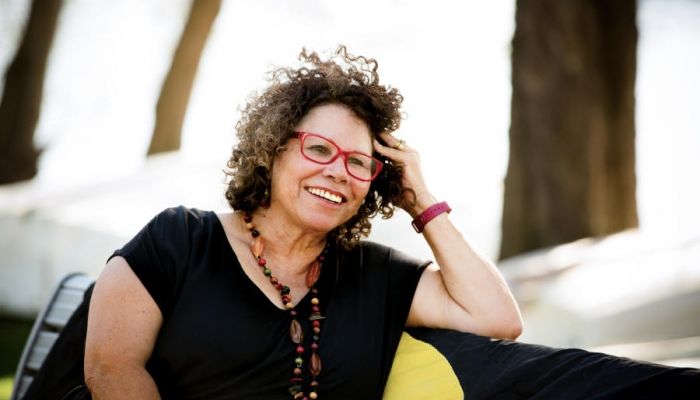Breaking the cycle of intergenerational trauma
8 November 2020

National NAIDOC Week 2020 is an opportunity for all Australians to celebrate the rich history, diverse cultures and achievements of Aboriginal and Torres Strait Islander peoples as the oldest continuing cultures on the planet.
This year, NAIDOC Week celebrations will take place from 8-15 November.
The original July dates were changed due to the impacts and uncertainty from the escalating COVID-19 pandemic across our communities and cities.
words simone worthing
Sue Hodges, from the Wiradjuri people of NSW, is an Aboriginal and Torres Strait Islander engagement coordinator for the Salvos in NSW and the ACT.
Sue is proud to be a Wiradjuri woman. “I grew up learning about the history and culture of my people and I feel sad for those who were robbed of this,” she says. “This is part of the intergenerational trauma so many of us have lived with and still experience today.”
It doesn’t take long for Sue to speak about trauma, although she is equally quick to share about her happy childhood on the Nanima Mission in Wellington, on the Great Western Plains of NSW, and the many good memories she has.
“We were part of a mission environment – our family, my aunties, uncles and cousins,” she says. “I would play with cousins, though, who would be there one day and gone the next. I later learned that ‘welfare’ came and took them away. Despite knowing some of what was going on, I was able to live in a fantasy land, skipping through pumpkin patches and chasing beetles. Maybe that’s how I became so resilient.”
What she didn’t know, until just two years ago, was that her mum, who died when Sue was only 20, had been part of the Stolen Generations. “I always wondered why we couldn’t find Mum’s history for our family tree,” says Sue. “As a young teenager, she just seemed to suddenly be working as a nanny for white property owners. I just thought this was a legitimate job.
“I do remember my mother, though, saying that she was a ward of the state and couldn’t go home until she was 21, but only recently did I learn what that really meant. Mum and her siblings were taken and put into care after Mum’s mum, Nan, was hit by a car. I was in shock when I discovered this, but it explained a lot, too. Putting the pieces of this family puzzle together helped me to see what our people had been through and why they were struggling.”
At the age of seven, Sue and her extended family and community, were part of the Aboriginal Inland Mission. She remembers being segregated from the rest of the town unless they had exemption certificates. “Certificates meant you could move off the mission and live in the mainstream, send your kids to mainstream schools and gain employment in mainstream work,” she explains.
“I remember the racism that came with this, too. My brothers and I were enrolled in the local public school but weren’t allowed to speak Wiradjuri, hunt traditional food, attend cultural performances or corroborees. Our families told us not to talk about our culture at school – they were worried we would be taken away. We lived in a white world at school, just to survive, but an Aboriginal world at home.”
 Sue and her husband, Michael.
Sue and her husband, Michael.
TURNING POINT
Sue’s dad and mum passed away in 1981 and 1983, respectively. She also lost her three brothers, each in tragic circumstances, between 1989 and 2009. By then, she had married Michael and they had two sons and two daughters. Sue was also active in Kairos Prison outreach as a volunteer, a passion which continues today.
“I was a lost soul after my last brother died,” says Sue. “Alcohol took over for a while. I felt like I’d let my parents down.”
In 2009, Sue went to a Kairos weekend and committed her life to Jesus. Soon after, she began attending a local Uniting Church. In 2015, Sue and Michael started going to The Salvation Army at nearby Bonnells Bay on the Central Coast of NSW. Sue attended Bible studies there and helped with the cafe, kids church and Indigenous outreach. She has been working for the Salvos since 2017.
“It’s amazing what God can do you in your life,” she says. “I’m a different person, a new person, and I love being the person God has made me. God gives us free will to do what we want to do, but gives us the strength to follow him. I am prone to depression, loneliness and negativity, but having a friend in Jesus means I don’t have to resort to getting a bottle of plonk. If I’m feeling down or want to cry, I can go to the Scriptures, pray about what’s troubling me, and get out of that space.”
MAKING A DIFFERENCE
Sue is passionate about reconciliation between Indigenous and non-Indigenous peoples and seeing healing for her people, particularly those in prison, where Aboriginal and Torres Strait Islander peoples make up 28 per cent of those incarcerated, despite being only three per cent of the general population.
“Like Jesus gave me, I want to help bring happiness and new life to others through him and show them how to live a full life the way God intended,” she says.
“I believe the ‘plans and hope for a future’ that the Bible talks about in Jeremiah chapter 29, verse 11 are for me. God has led me to love serving others. I have been healed and saved for a purpose. I wouldn’t be here if it wasn’t for Jesus.”
